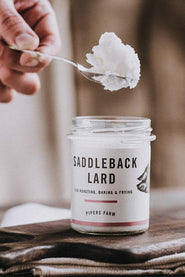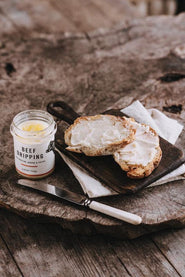For so many of us, we take great pleasure in devouring fat; golden slightly salted butter smothered onto fresh bread, sizzled fatty lardons tumbled into a green salad awaiting a dousing of vinegar, or crunchy pork crackling - the best bit of a Sunday roast.
Sadly there are many that fear fat.
For years, most people believed that eating fat would make you unhealthy, from fears of heart disease to weight gain, fats were demonised brought about in part by a campaign from the sugar industry back in the 1960s, which paid scientists to blame saturated fat, and not sugar, as a major cause of heart disease and other illnesses.
As the nation's diet changed, we gained weight and became more sedentary. Fats, as our grandparents knew them began disappearing from our shelves, and in their place came highly processed trans fats, ‘low fat’ foods and ‘cheap’ vegetable oils. We sacrificed flavour, texture, food waste, nature and culture in the quest to improve our health.
We have never been more obsessed with our diet, exercise regime, mental wellness and the pursuit of living longer. It’s safe to say that these days you cannot pick up any form of media, from social to TV and magazines without being faced with an image of a glowing young body dressed in lycra, or a bowl of lackluster salad free from almost everything, and yet globally we have never been fatter or unhealthier physically and mentally.
Fats and Science
It is no wonder there have been so many misguided studies on fats. The way fat reacts to our bodies is incredibly complex, we are learning so much about this all the time, however one thing is for sure eating animal fat didn’t kill our ancestors, in fact, it is a large part of the survival and successful development of our species. Like learning to make fire, our ancestors instinctively knew fat was good. Secondly, there is no legitimate evidence that eating a low-fat diet improves or lengthens our life.
Every cell in our body needs fat to function. Fat is important for the functioning of our brain, it supports our immune system, regulates our digestive system and keeps us sated for longer. Diets low in fat often leave people more prone to weight gain, depression and illness.
Today's diet has changed more dramatically than at any other time in our history. Since the industrial revolution, food has become more plentiful, seasonality and local produce has eroded, and we have increased our intake of food. We now eat more processed foods and large amounts of processed oils, meaning our mission from the 1960s to avoid fat has in fact become the polar opposite. Processed fats and fatty oils are lurking in more foods than ever and we are consuming them at a rapid rate.
Fats occur naturally in the food we eat, including foods you don’t readily associate with being ‘fatty’ like avocados, walnuts and almonds. It is often the processing of these fats that can change the effect they have on our body and turn them from safe to problematic.
The Different Types of Dietary Fats
Trans Fats
Found in highly processed foods. They are incredibly difficult for our body to process because they interfere with our natural insulin production, promoting diabetes and obesity.
Polyunsaturated Fats
Unhydrogenated Polyunsaturated Fats are very unstable, they oxidise easily and when heated too high they can become damaging to our body. Once taken too hot the fatty acids can suppress our immune system. However if eaten in the foods they occur in, in their natural state, like seeds, nuts and oily fish they are brilliant for boosting our omega 3.
Monounsaturated Fats
Found in olive oil, avocados and nuts, monounsaturated fats provide food for beneficial bacteria and can improve the good to bad ratio of cholesterol in your blood. Like Polyunsaturated fat it they are less stable than the likes of saturated fat and so can become harmful if the chemicals begin to break down through too much heat.
Saturated Fats
Our body needs saturated fat to repair cells. Not having enough saturated fat can inhibit our ability to make vitamin D. Saturated fat, from pasture fed livestock has a high proportion of CLA, which is credited for fighting cancer and preventing heart disease.
Fat and the Environment
Our livestock are reared on a low input system, this means feeding them what nature provides, in the case of beef and lamb this is grass and mothers milk only, and chicken, ducks and pigs, a wholegrain cereal mix with plenty of forage.
Our native breeds are grown slowly, ensuring not only the best welfare for our livestock, but also the animals mature at a natural rate. The extra age allows our livestock to build strong carcasses full of nutrient-rich marrow, and lay down proper fat that has real texture and flavour.
Purely pasture reared livestock lay down the most incredible fat. The rich minerals and nutrients from our deep-rooted grasses are imparted into the meat like a sponge soaking up all the goodness. As our livestock spend their lives outside, they are soaking up super vitamins from the sun, which is directly converted into their meat.
We rear native breeds, chosen specifically so they perform well in our landscape, making use of all the ingredients nature provides. Our Red Rubies can digest the rough Exmoor grass and convert it into protein with zero input. This allows land to be farmed and communities to be sustained where otherwise there would be very little resource available. Turning a rugged and difficult land into an abundant rich landscape that produces nourishing, healthy, high welfare food that simultaneously becomes a haven for wildlife.
Fat and Food Waste
When chefs talk about a nose to tail approach to eating it more often than not drives me mad. A Jamie Oliver recipe for Ox cheeks with all its very best intentions causes chaos in terms of the sustainable production of meat.
A bullock, as you know, only has two cheeks, and so when all of a sudden everyone wants to make an ox cheek stew this causes a huge unbalance with the rest of the carcass.
For every bullock that we produce almost 25% of the carcass weight is bone, which could be eaten (in broths/stocks, marrow and dog bones) and 25% fat (dripping, suet, and fatty cuts) all perfectly consumable if we only had the desire to eat it.
Proper nose to tail eating means eating everything that is available on the carcass with a proper understanding of proportions. If we are to truly eat sustainably we must take into account the potential waste caused in avoiding certain parts of the animal or eating an unbalanced mix. To avoid excessive and unnecessary food waste eating fat as part of our diet is key.
Fats and The Future
Not only has our diet altered but the way we think about food like fats has fundamentally changed. We have become fearful and untrusting of ingredients that have kept our species evolving for thousands of years. We spend less money on food, less time cooking and even less time eating.
We must re-evaluate our relationship with food. We need connect ourselves with the source of food we put on our tables, no longer blindly and mindlessly graze through life. We all need to take responsibility for the food that we eat, the impact this has on our health but also the impact on the environment.
Our Range of Fats
We utilise as much fat as possible across our range of products, turning it into something delicious for you to enjoy, you can shop our collection of pure fats including: Grass Fed Beef Dripping, Saddleback Lard, Organic Ghee and Pure Goose Fat.
Or choose from some of our most delicious products like: Saddleback Streaky Bacon and Confit Duck Leg.
Why not try our recipe for Pork Rillettes with Piccalilli





